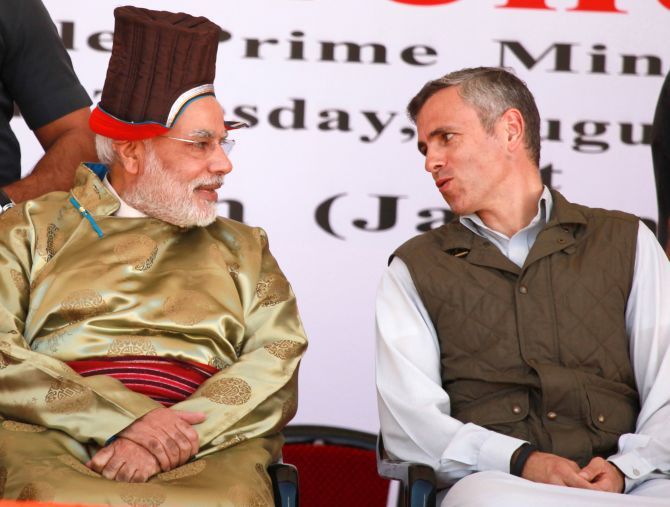 | « Back to article | Print this article |
A PDP-BJP alliance would have been formed on the evening of December 28 had the BJP agreed to let Mufti Mohammad Sayeed become chief minister for the first three years and allow the BJP to nominate its chief minister for the next three years.
Sheela Bhatt/Rediff.com has the exclusive report.
 A week after the election results in Jammu and Kashmir were announced, the delay in forming a government is due to the Bharatiya Janata Party's demand to lead a coalition government first.
A week after the election results in Jammu and Kashmir were announced, the delay in forming a government is due to the Bharatiya Janata Party's demand to lead a coalition government first.
The hung assembly result has thrown up the slim opportunity to have the first Hindu chief minister in Jammu and Kashmir, India's only Muslim majority state, right away.
The largest single party in the 87-member assembly is the Peoples Democratic Party led by Mufti Mohammed Sayeed with 28 seats.
The BJP, which won 25 seats (all in Jammu and none in the Kashmir valley or Ladakh) claims it has the support of another 6 elected members.
The Congress party has 12 seats while the National Conference has 15 seats.
The PDP, National Conference and Congress are vertically divided over the BJP's demand that one of its Hindu leaders -- which could well be someone who has not been elected in the assembly election -- from Jammu lead a coalition government.
There is talk that elected members of the National Conference and PDP will rebel against their respective leaderships if their leaders form an alliance with the BJP and accept the BJP's demand for a Hindu chief minister.
Other reports suggest that members of these regional parties and even the Congress party could break away and help the BJP attain its dream of a Hindu chief minister.
Leaders like the PDP's Mufti Mohammad Sayeed and the National Conference's Omar Abdullah privately argue that there is tremendous pressure on their parties inside the Kashmir valley not to allow a Hindu chief minister under any circumstances.
The BJP is bargaining on its strength of 31 seats. A PDP-BJP alliance would have been formed on the evening of December 28 had the BJP agreed to let Mufti Mohammad Sayeed become chief minister for the first three years and allow the BJP to nominate its chief minister for the next three years.
Unlike other states in the Indian Union with five-year terms for their legislatures, the Jammu and Kashmir assembly has a six-year term.
But the BJP has been adamant to have the first chance to lead such a coalition; it would prefer that Mufti Mohammad Sayeed be the chief minister between 2018 and 2020.
BJP leaders feel after three years the regional party could succumb to pressure and not honour the agreement of a split chief ministership between the allies.
Clearly, the BJP is in bargaining mode.
The regional parties are worried about their future if they accept the BJP's demand for a non-Kashmiri Muslim from Jammu to lead the Muslim-majority state.
Prime Minister Narendra Modi and BJP President Amit Shah are monitoring the developing situation from New Delhi while Ram Madhav, who planned the party's election campaign in the state, is camping in Jammu.
Mufti Mohammad Sayeed, a leader who is too experienced not to understand the BJP game, reportedly, told one BJP leader, 'If I accept your demand to have your man lead the government in Srinagar I will not be able to face the people in the valley.' The BJP leader responded, 'If I accept your demand, I won't be able to face people in the rest of India.'
The BJP leadership is patient and weighing all its options carefully. Given the stakes in the troubled Kashmir valley, they are treading carefully.
Without the BJP's help, the PDP will need to reach out to its bitter adversary, the National Conference. Even if that unlikely situation materialises, the PDP-National Conference alliance will be one short of a majority in the assembly.
How such a government will govern even if it survives is the question. This makes the BJP's position strong and demand something that is unthinkable and unacceptable to politicians in the Kashmir valley.
BJP leaders are fully aware of the odds it confronts, but the December 23 electoral veridct has given it an opportunity to try and create history.
Prime Minister Narendra Modi with then Jammu and Kashmir chief minister Omar Abdullah. Photograph: Umar Ganie